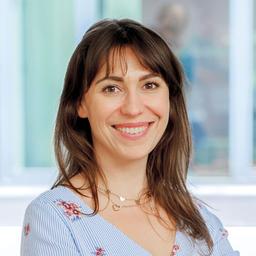
Reading in one language, thinking in another and ceasing to exist.
She joined the ranks of MakoLab in January 2021. As our English translator and language consultant, she nurtures the cohesiveness, comprehensibility and directness of our message.
Insights is pleased to introduce Caryl Swift! It’s thanks to her that you can read our interviews in English… but don’t make the mistake of thinking that she can be defined that narrowly! Why? Read on to find out!
Where exactly do you come from?
These days, the answer is Słupsk! I’ve certainly lived here long enough to have put down some serious roots. But going further back… I was born in Hampshire, in south-east England, in a town called Farnborough. It’s not very well-known, unless you’re into aerospace and defence! It’s the place where the first powered flight in the UK was made, by a former Wild West showman, Samuel Cody. It’s home to the Farnborough International Airshow, which is second only to the Paris Airshow. All sorts of famous military and commercial planes have made their debut at the show… and because there used to be a major aerospace R&D establishment there, many of them, like Concorde, for instance, were also developed there. And Farnborough neighbours on the town of Aldershot, aka the ‘Home of the British Army’…
So, growing up in an environment like that, it was only natural that I decided to make theatre my career! That took me to the west coast of Wales, to the University of Aberystwyth on Cardigan Bay, where I studied English, classical studies, theatre studies, acting and directing. And to be honest, when I graduated and moved on, I left a piece of my heart behind… and it remains there to this day. In a way, then, I also have roots there.
How many years have you been in Poland? And what brought you here?
Thirty-two years… so yes, I’m totally dinosauric! In 1989,I was working in an arts centre, running a small-scale professional theatre-in-education (TiE) company, a community theatre company, a young people’s theatre company and a children’s theatre company. Part of the job involved inviting theatre professionals to run workshops that were open to all. We received some promotional material from an iconic venue, the King’s Head Theatre, a pub theatre in London. They were organising workshops run by the director of a Polish alternative theatre company and one of the actresses. The company was Teatr Blik, based in Koszalin, and the director was Jupi Podlaszewki. I invited them to our arts centre and the workshop was so popular that, when the King’s Head told us that Jupi would be coming back with the entire company in February 1990, bringing a children’s show, a workshop and a show for adults, we booked them immediately. ne member of the company was a director and actor, Stanisław Miedziewski, from Słupsk and he ran the workshop. Jupi told us about a two-week, international workshop that he and Stanisław would be running that August in Koszalin and I decided to go, together with four of the TiE company actors.The workshop was fabulous! During our time there, Jupi and Stanisław approached me and said that they were setting up a new, small-scale, international theatre company and they invited me to become part of it. I said yes! I went back to the UK,dealt with all the things that needed organising and then came back, at the end of September.I was supposed to come for nine months……but here I am… and I’ve been working with Stanisław Miedziewski ever since…
How did you become a translator?
Well, theatre’s a terribly precarious way of earning a crust, so I’ve always ended up doing other work, as well. To give you just two examples, while I was still in the UK, as well as working at the arts centre, I used to teach theatre studies at the local college and I ran a drama course for trainee nurses… the aim was to help them develop confidence and various tools for working with people.
In Poland, in tandem with the theatre work, I was involved in working with language from the outset, teaching English and working as a language editor with scholars writing articles and so forth in English. Once I started teaching at the higher education level, one of my jobs was working with the students on the language editing of their diploma theses. All this meant that I was deeply involved in the written word not only as a student, but also from the moment I graduated. In 1993, I was approached by an alternative theatre company from Szczecin, Teatr Kana. They were heading to the Edinburgh Festival with a renowned solo theatre work, Moscow-Pietuszki, directed by the late, great Zygmunt Duczyński, who also wrote the script, which was based on Venedikt Yerofeyev’s work. They had a translation of sorts and they asked me to work with the actor, Jacek Zawadzki, on preparing the role in English. Jacek spoke quite good English and, as an actor, he wasn’t happy with everything in the translation. Neither was I, because it was quite a minefield of errors, so as we worked on transcreating the role in English, we also retranslated things so that they worked for him and for the rhythms of the production while reflecting the original as closely as possible.
The play had an excellent reception in Edinburgh and the company was invited back the following year to perform their ensemble production, Nightetcetera, etcetera, etcetera, was almost a sub-course in itself and ‘in a new translation by’ is often a major selling point for a new production of a foreign play.
For a number of years, I continued working with various alternative theatre companies and actors on the English versions of productions they were taking abroad. Then, between 2005 and 2007, while I was working as an actress at the Wojciech Bogusławski Theatre in Kalisz, I also collaborated closely with the then Director, Robert Czechowski, on developing his international programme, which involved a lot of translation. At the same time, I slowly started spreading my wings as a translator, working in fields beyond theatre, though obviously still more literary than scientific… fields like history, tourism, marketing and so forth. No nuclear physics or similar… not then and not now!

What are the most challenging aspects of your work?
One crucial aspect of translation is the fact that a translator needs to be an excellent writer in their native language… and, odd as it may seem, it’s even more vital when the source text is badly written. Sadly, that happens all too often and it really does cause problems. Another issue is when the person writing a text doesn’t do their ‘homework’, which can lead to anything from misspelling foreign names to getting dates, places and so forth completely wrong! When you can’t trust your source text, it’s much harder to get into the flow, as it were.
Time can also be a challenge. Someone spends days or weeks or months crafting their text and then they’re surprised when the translator can’t deliver the translation by yesterday! Crafting a translation needs time, too! Another major problem is the fact that people often get impatient when they’re asked to provide some context for a translation. What do I mean by that? Well, what kind of text is it? What is its purpose… what is it intended to achieve? What is the target readership? Where will it be used or published? If the translator doesn’t have fundamental information like that, then how can they create a text that does what it needs to do in another language and another linguistic culture? Translating is reading in one language but thinking in another, while becoming the ‘voice’… finding a way of transcreating the author’s voice. In 2016, I translated a book about Krzysztof Kieślowski. It included something his long-term translator, Dorota M. Paciarelli, said about working with him during international workshops and, even though, in this case, she’s talking about interpreting for him, in other words, the spoken rather than the written word, to me, it sums this up perfectly:
I coined a description for myself after many years of working as his translator. As you know, a translator ceases to exist if they’re a good translator, so for twelve years or so I didn’t exist as a person during classes, I just stationed myself in Krzysztof’s head and I was an extension of him (…)1
Thank you, Caryl, for some fascinating insights not only into your life, but also into a bit of Polish theatre and UK history. To mark the fact that today is International Translation Day, we wish you nothing but inspiring texts and limpidly clear authors, with no translation ever demanded for yesterday. May every text be accompanied by all the context you could wish for!
1 Dorota M. Paciarelli, quoted in Kieślowski Years Later. Mirrored in Opinions and Recollections, Caryl Swift (trans.) Stanisław Zawiśliński, Krystyna Zamysłowska (eds.), KinoArt Film Association, Łódź 2016.
The image is based on a design by Andrzej Szczepłocki.
Translated from the Polish by Cary Swift

Kamila Braszak
Employer Branding Specialist




